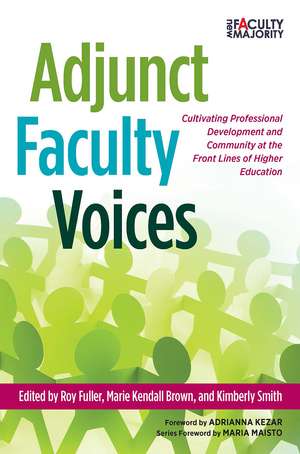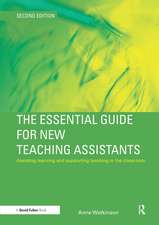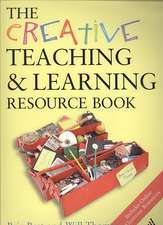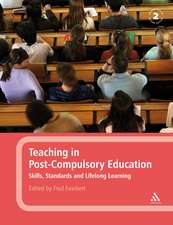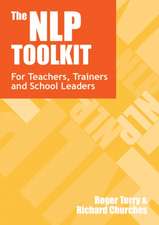Adjunct Faculty Voices: Cultivating Professional Development and Community at the Front Lines of Higher Education
Editat de Roy Fuller, Marie Kendall Brown, Kimberly Smithen Limba Engleză Paperback – 2 oct 2017
| Toate formatele și edițiile | Preț | Express |
|---|---|---|
| Paperback (1) | 247.67 lei 6-8 săpt. | |
| Taylor & Francis – 2 oct 2017 | 247.67 lei 6-8 săpt. | |
| Hardback (1) | 997.73 lei 6-8 săpt. | |
| Taylor & Francis – 5 oct 2017 | 997.73 lei 6-8 săpt. |
Preț: 247.67 lei
Nou
Puncte Express: 372
Preț estimativ în valută:
47.39€ • 49.65$ • 39.28£
47.39€ • 49.65$ • 39.28£
Carte tipărită la comandă
Livrare economică 09-23 aprilie
Preluare comenzi: 021 569.72.76
Specificații
ISBN-13: 9781620363720
ISBN-10: 1620363720
Pagini: 170
Dimensiuni: 152 x 229 x 10 mm
Greutate: 0.37 kg
Ediția:1
Editura: Taylor & Francis
Colecția Routledge
Locul publicării:Oxford, United Kingdom
ISBN-10: 1620363720
Pagini: 170
Dimensiuni: 152 x 229 x 10 mm
Greutate: 0.37 kg
Ediția:1
Editura: Taylor & Francis
Colecția Routledge
Locul publicării:Oxford, United Kingdom
Public țintă
PostgraduateCuprins
IntroductionPart I. Who Are Adjunct Faculty? 1. A Portrait of Adjunct Faculty 2. Adjunct Voices 3. Co-Creating Communities of Adjunct Faculty. Mobilizing Adjunct Voices through Connective Storytelling. Brandon Hensley 4. Exiting the Freeway Faculty Path. Using Professional Development to Get out of Cruise Control. Victoria Shropshire 5. We Know We Have Lost. Contingency, Grieving, and Imagination. Chris Potts 6. Using a Community of Practice to Enhance the Adjunct Experience. Paul G. Putman & Bridget A. Kriner Part II. Adjunct Faculty Development. Personnel and Programs 7. A Survey of Adjunct Faculty Developers 8. Model programs across the country, Introduction 9. Creating Faculty Development Opportunities for Adjuncts. Suzanne Tapp & Andrea McCourt 10. Creating an Adjunct Community and Supporting its Professional Development. Kirkwood Community College. Bonde, Larry 11. Cultivating Scholarly Teaching through Professional Development, Ann Coburn-Collins, Anne M. Acker, Lester L. Altevogt, and Lisa S. Tsay 12. The Transformative Effects of an Adjunct Faculty Academy. One Approach to Teaching Adjuncts Pedagogy, Instructional Design, and Best Practices. Summer Cherland, Heather Crook, Lindsey Dippold, J.W. Gaberdiel, and Jenalee Remy 13. Best Practices and Innovative Faculty Development for Adjunct Faculty. Ruth Fagan-Wilen Conclusion Appendix About the Editors and Contributors
Notă biografică
Roy Fuller has taught in adjunct capacities for over twenty years. He currently teaches in the Department of Comparative Humanities at the University of Louisville where he also works in faculty development, specializing in supporting adjunct faculty. Marie Kendall Brown works in faculty professional development with a focus on teaching, learning, and educational innovation. She received her Ph.D. in Higher Education from the University of Michigan. Kimberly Smith received her Master in Counseling and Personnel Services with a concentration in College Student Personnel from the University of Louisville. Adrianna Kezar is a professor of higher education at the University of Southern California and codirector of the Pullias Center for Higher Education. Kezar is a national expert of student success, equity and diversity, the changing faculty, change, governance, and leadership in higher education. Kezar is well published with 18 books and monographs, more than 100 journal articles, and more than 100 book chapters and reports. Recent books include Envisioning the Faculty of the 21st Century (Rutgers University Press, 2016), How Colleges Change (Routledge, 2013), Enhancing Campus Capacity for Leadership (Stanford Press, 2011) and Organizing for Collaboration (Jossey-Bass, 2009). She is the project director for the Delphi Project on the changing faculty and student success and was just awarded a grant from the Teagle Foundation for institutions that better support faculty and create new faculty models.
Recenzii
"This book is a lucid analysis of the adjunct faculty crisis. It adds to the literature by updating the taxonomy of adjuncts in useful ways, but it is not just an academic exercise. Finally, a book that gives voice to contingent faculty themselves, their struggles and their accomplishments. The 4 areas for improvement identified—identification/ recruitment, community, equity, and development—are followed up with replicable models. A remarkable work, appealing to both adjunct faculty and administrators!"
Michele DiPietro, Executive Director, Faculty Development and Recognition, Center for Excellence in Teaching and Learning
Kennesaw State University
"With research findings on the status of adjunct faculty in U.S. higher education, first-hand accounts of the contingent faculty experience, and emphasis on the importance of engaging these faculty fully in the academic community, the editors of Adjunct Faculty Voices bring these 'invisible' part-time educators into clear view. Adjunct Faculty Voices is a welcome addition to the growing body of research on contingent faculty, and recommended reading for full-time faculty and administrators whose departments and institutions rely on adjunct faculty."
Cynthia Wilson, Vice President for Learning and Chief Impact Officer
League for Innovation in the Community College
"Authentic community is essential to professionalism and professional development. However, neither is possible where members of the community are ignored or mistreated. This book is an important step to rebuilding the community necessary to ensure that contingent faculty can effectively ensure quality and equality in higher education."
Maria Maisto, President/ED, New Faculty Majority: The National Coalition for Adjunct and Contingent Equity and the NFM Foundation
“A strength of Adjunct Voices is the array of best practices the editors chose to showcase. The specific initiatives that have been implemented are drawn from across a range of institution types, including teaching-oriented universities, research universities, and community colleges. The cases are sensitive to and underscore the importance of organizational context as a factor in administrators’ willingness to invest resources. At colleges able to draw from a far larger pool of potential instructors, convincing cash-strapped administrators to fund robust adjunct development can be more challenging but, as examples in the book demonstrate, not impossible.
Adjunct Voices will be a useful volume for administrators, faculty leaders, and individual adjuncts seeking to establish professionalized working conditions for part-time instructors. Institutions could directly apply the best practices identified in the book, as well as leverage its themes to inform a survey of non-tenure track faculty to ascertain interest in existing and potential professional development opportunities on their own campuses. Adjuncts themselves can draw from the experiences of others to create their own networks and communities on campus as well as advance their personal professional development. Most significantly, Adjunct Voices serves an important function by bringing to the forefront the stories and needs of a faculty group that is typically marginalized but essential to higher education.”
Teachers College Record
From the Foreword:
“Throughout [Adjunct Faculty Voices] there is a common return to the idea that community needs to be restored to the professoriate. The authors outline an ambitious agenda of work for academic leaders to truly reinvent higher education so that adjuncts are treated as professionals, embraced as part of the faculty community, and moving from the margins, to be at the center where they belong."
Adrianna Kezar, PhD, Professor, USC, Co-director Pullias Center and Director Delphi Project
Michele DiPietro, Executive Director, Faculty Development and Recognition, Center for Excellence in Teaching and Learning
Kennesaw State University
"With research findings on the status of adjunct faculty in U.S. higher education, first-hand accounts of the contingent faculty experience, and emphasis on the importance of engaging these faculty fully in the academic community, the editors of Adjunct Faculty Voices bring these 'invisible' part-time educators into clear view. Adjunct Faculty Voices is a welcome addition to the growing body of research on contingent faculty, and recommended reading for full-time faculty and administrators whose departments and institutions rely on adjunct faculty."
Cynthia Wilson, Vice President for Learning and Chief Impact Officer
League for Innovation in the Community College
"Authentic community is essential to professionalism and professional development. However, neither is possible where members of the community are ignored or mistreated. This book is an important step to rebuilding the community necessary to ensure that contingent faculty can effectively ensure quality and equality in higher education."
Maria Maisto, President/ED, New Faculty Majority: The National Coalition for Adjunct and Contingent Equity and the NFM Foundation
“A strength of Adjunct Voices is the array of best practices the editors chose to showcase. The specific initiatives that have been implemented are drawn from across a range of institution types, including teaching-oriented universities, research universities, and community colleges. The cases are sensitive to and underscore the importance of organizational context as a factor in administrators’ willingness to invest resources. At colleges able to draw from a far larger pool of potential instructors, convincing cash-strapped administrators to fund robust adjunct development can be more challenging but, as examples in the book demonstrate, not impossible.
Adjunct Voices will be a useful volume for administrators, faculty leaders, and individual adjuncts seeking to establish professionalized working conditions for part-time instructors. Institutions could directly apply the best practices identified in the book, as well as leverage its themes to inform a survey of non-tenure track faculty to ascertain interest in existing and potential professional development opportunities on their own campuses. Adjuncts themselves can draw from the experiences of others to create their own networks and communities on campus as well as advance their personal professional development. Most significantly, Adjunct Voices serves an important function by bringing to the forefront the stories and needs of a faculty group that is typically marginalized but essential to higher education.”
Teachers College Record
From the Foreword:
“Throughout [Adjunct Faculty Voices] there is a common return to the idea that community needs to be restored to the professoriate. The authors outline an ambitious agenda of work for academic leaders to truly reinvent higher education so that adjuncts are treated as professionals, embraced as part of the faculty community, and moving from the margins, to be at the center where they belong."
Adrianna Kezar, PhD, Professor, USC, Co-director Pullias Center and Director Delphi Project
Descriere
Stories abound regarding the poor conditions in which adjunct faculty labor, yet many of those that employ adjunct faculty are unaware of how the conditions impact an adjunct's ability to teach.
